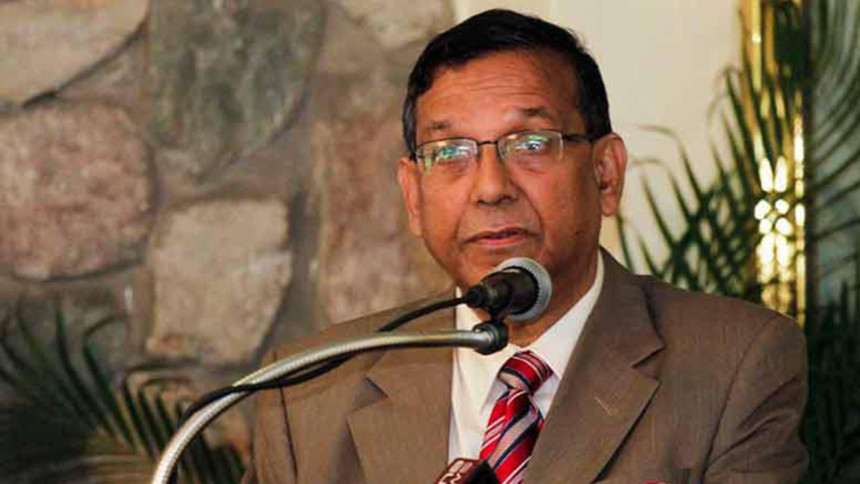No to partisan prosecution

The government has decided in principle to launch a permanent prosecution service with professional lawyers, by abolishing the long-standing practice of appointing partisan people as public prosecutors.
"An independent prosecution service will be introduced in phases. We are considering empowering the Judicial Service Commission to make the appointments," law Minister Anisul Huq told journalists after emerging from a session of the DC conference at the Cabinet Division yesterday.
The government is now assessing the cost as well as the size of the manpower needed, law Secretary ASSM Zahirul Haque Dulal told The Daily Star when contacted.
At present, there are some 4,000 public prosecutors as well as additional and assistant prosecutors and government pleaders, according to the law ministry.
In case of a crime, it is the responsibility of the state to punish the offender, which depends largely on the performance of the public prosecutors who represent the state in lower courts. But because of their poor performance, only 25 to 30 percent cases see conviction, legal experts say.
On the other hand, government pleaders pursue civil cases before lower courts across the country.
Whenever a political party forms the government, all prosecutors and pleaders appointed by the previous administration are replaced by a new group.
In the appointments, loyalty to the ruling party rather than efficiency gets priority.
The lack of an effective procedure to screen and appoint prosecutors sometimes creates embarrassing situations. In June 2007 for example, a lawyer accused of a murder was appointed public prosecutor in Naogaon district. He was appointed by the district magistrate with the law ministry's approval.
On July 5, 2015, Chief Justice Surendra Kumar Sinha himself decried the existing system of appointing ruling party men as public prosecutors as well as the faulty investigation by police. He also spoke about their poor knowledge about criminal laws.
“There is shortcoming not only in investigation, but also in prosecution as the public prosecutors do not perform their duties properly,” he said.
Against this backdrop, the government has moved to introduce the permanent prosecution system, which many countries, including India and the UK, already have.
Two former law ministers Moudud Ahmed and Shafique Ahmed, who had tried to introduce the system, welcomed the government decision.
It has been a long-standing demand for reforming the highly politicised prosecution system. But the demand remains unmet, thanks to successive governments' policy of appointing ruling party men in the posts.
Anisul's predecessors Moudud and Shafique during the past BNP and AL-led governments' tenure had moved to change this in vain.
Moudud was critical of the political appointment. In 2005, he said inefficiency of the prosecution led to the quashing of some 70 percent cases.
Under his initiative, a two-day consultation on the introduction of the proposed government attorney service was held in May that year. But his move did not see the light for obvious reasons.
His successor Shafique had also tried, but failed to make any progress.
However, the last caretaker government-led by Fakhruddin Ahmed in 2008 had done the groundbreaking work for making a law through an ordinance to set up a permanent attorney department.
The ordinance had stipulated that an individual must have certain qualifications to get appointed as a public prosecutor.
The law ministry had also sent a proposal to the then establishment ministry for creating more than 3,000 posts for the attorney department.
Lawyers had welcomed the caretaker government's move.
But it made no further progress as the AL government that took office in January 2009 opted for retaining the system of appointing party men as prosecutors.
Talking to The Daily Star yesterday, Moudud said, "I appreciate very much the decision to introduce a permanent prosecution service though it is late."
He called on the government to implement the decision immediately. "If the prosecution service improves, the crime rate will come down."
When he was law minister during 2001-2006 BNP government tenure, he had moved to introduce the system. He said he even placed a draft law before the cabinet for its approval in 2004 or 2005.
"I could not introduce the attorney service. It was my failure," he added.
Shafique Ahmed, who was law minister of the past AL government from 2009-2013, said formation of a permanent prosecution service was a demand of the Asian Development Bank.
"I tried my best to bring reform in the current system," he said.
Once the new system is introduced, he said, it would help expedite the case disposal rate and reduce the huge case backlog.
If they are appointed permanently, they will try to dispose of the cases quickly as they will be solely responsible for it, Shafique added.
The former law minister also spoke about the poor remuneration for the public prosecutors.
Because of such poor pay, public prosecutors remain busy with private practice, he noted.
At the moment, public prosecutors and additional public prosecutors get Tk 500 a day and assistant public prosecutors Tk 200 in metropolitan areas.
At district level, the amount is Tk 250 and 150 respectively, an additional public prosecutor in Dhaka told The Daily Star last night.
In addition to this daily pay, public prosecutors and additional public prosecutors each get Tk 3,000 a month in office expenses in metro areas and Tk 1,500 in districts, he added.
And although assistant public prosecutors can do private practice and can take both criminal and civil cases, prosecutors and additional prosecutors can do so only for civil cases, he said.
“It is not possible to carry out the duty properly with such nominal pay,” he added.
At the conference, Noakhali DC yesterday raised the issue, saying the monthly allowance and honorarium for the public prosecutors was last fixed in 2003.
As they have been getting the same pay for the last 14 years, public prosecutors do not feel encouraged to represent the government in courts, he said.
Gaibandha DC recommended formulating a code of conduct for the public prosecutors and government pleaders.
About the poor pay, the law minister said the salaries of public prosecutors, government prosecutors, additional public prosecutors and addition government prosecutors would be hiked soon.



 For all latest news, follow The Daily Star's Google News channel.
For all latest news, follow The Daily Star's Google News channel. 



Comments